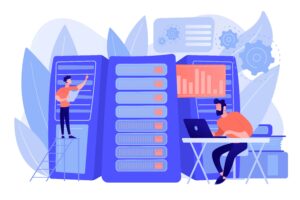
Using DataOps to maximize value for your business.

We live in a data-driven world, and as consequently, data-driven business is no more an option. Advanced data analytics is transforming the way companies make decisions and respond to market changes.
So, more and more people in the data industry discuss about DataOps. From recent conversations with customers, there is a growing demand for tools and platforms that address the growing pains and challenges of data teams. Businesses have to adapt to our changing world if they want to remain competitive. One aspect of this adaptation is being agile and making fast decisions in order to pivot in the ever-changing market.
But data and analytics transformation doesn’t always deliver on its promised value. There can be several reasons for this, but one of the main ones is that the information generated by the data is not translated quickly enough. Data processing and analysis sometimes takes so long that by the time the information is finally available, it is often too late to act.
Streamlining the ways in which all organizational data is managed, transformed and ultimately fed back to the business as meaningful insights is a challenge every organization has to relate to.
DataOps brings this capability and power of analytics into the hands of business units so they have the right tools to make informed decisions and adjust in the digital age.
In this article, I’ll outline the key components needed for a successful DataOps approach, the skills and sourcing strategy that can help.

What Is DataOps?
The DataOps approach is the orchestration of people, processes and technologies. It aims to deliver confidence and fast, reliable, high-quality data in a concerted way.
Powered by automation, DataOps tackles the challenges associated with inefficiencies in accessing, preparing, integrating and making data available.
DataOps draws inspiration from lean manufacturing and the agile nature of DevOps. Just like DevOps systematized software development, DataOps aims to accelerate the collection, processing and analysis of data.
Involve a cultural change to focus more on collaboration
DataOps involves a cultural change to focus more on collaboration across all functions and service delivery using lean practices. It requires commitment from leadership to support and sustain a data-driven vision across the business.
Focus on your organization needs
Each organization has unique needs. This type of cultural change begins with understanding the true goals of the business by asking yourself the following questions. How does data inform the decisions and services impacting customer experience? How can data help maintain a competitive advantage in the market? What are the customers priorities that data can help us solve?
Find the right skills
You can’t just have a great big data team. You need a killer DataOps team. Top skills that go into DataOps success are data modeling techniques. Other critical skills and knowledge include data integrity, including data-testing best practices, along with the ability to navigate data management systems and other kinds of software.
Other important core competencies, include knowledge of logical and physical data models, data-loading best practices, orchestration processes, and containers.
As for technical skills, specific software experience can include Docker, Kubernetes, Jenkins for pipelines, and Git for version control. This is in addition to the typical data management software such as databases and streaming software such as Kafka or Flink.
Note that most DataOps practices revolve around Python and Scala skills. But understanding R, Lambda, Git, Jenkins and other containers can be a big boost to standardizing and automating the pipeline.

Find the right talent mix
The key formula is having the right people in the right job or augmenting the skill set of the current team. But things have changed significantly in the age of the cloud. Fueled by digital transformation, the “war for talent” in data and analytics doesn’t make it easy. To deal with it, employers need a solid sourcing strategy to get access to the right talent and skills.
At a minimum, you will need a Cloud Administrator, a Cloud Architect to build a roadmap for your organization’s existing and futures assets and a Cloud Security Architect to protect your data. Note that this doesn’t include data engineers, data scientists or analysts who will use the cloud platform, just the team to build and run it.
Depending on the size of your company, these roles will need be filled by full-time employees or possibly a mix of full-time and part-time employees and/or contractors.
That’s why, for every big data success story, there are sad tales of projects that can’t get off the ground because the company just can’t find or keep the right team.
Find the right balance between in-house recruitment and outsourcing
Whether you choose to outsource your IT projects to a consulting firm or hire the talent you need to complete your internal team, it is critical to have a solid plan when you go-live to not only support the implementation but also deliver new capabilities. It depends on your issues.
You need to think about your needs, expectations, and possibilities. Do you have a lot of time? Do you want to go long-term with your DataOps team? Do you need quick wins? Depending on what you identify as the factors most important to your business, you may choose in-house or outsourcing as the best solution for you.
But you have to keep in mind that as end-user demand evolves, so too must the technology to support innovation. A skill needed yesterday may be obsolete within just a few years. It’s seldom possible to hire a few experienced data talents who can do it all, year after year, project after project. Technology doesn’t stand still and you can easily have a team of talented people well-versed in legacy systems that are no longer relevant.
If your team lacks the necessary skills, your current resources are over capacity or unavailable, outsourcing can save you precious time. It will provide the exact expertise you need for only the time you need it, or on an ongoing basis. Either way, you get the skills you need at the right time with no risk contract.
Here’s the good news. If you’re looking for a team that will introduce you to the amazing world of data wonders, Stroople provides customized solutions to design and build your technology dream team. You can choose the best solution that suits you. We provide tech talents pros whether you need to hire or outsource your DataOps team.


